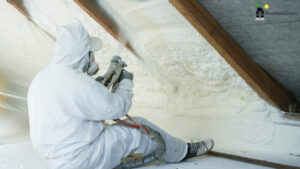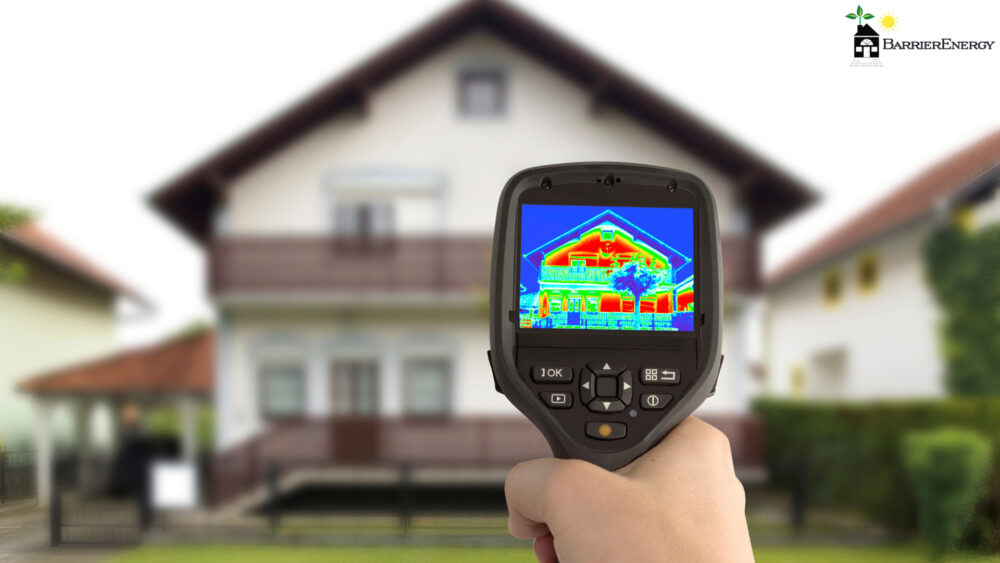No Pests Should Live Rent-Free:
Are you interested in learning how to keep pests out of your home? When the temperature drops, bugs and insects will begin looking for a home. Yet, no one likes the thought of these unwelcome guests. We would prefer they find another form of shelter outside. Pest control companies will try to sell you on the idea of using toxic chemicals in or around your home. However, this band-aid approach will only last a short while. Eventually, you’ll have to buy more products and you’ll have to spend more time and money re-applying. It’s a good business model to keep you coming back, but it’s not actually fixing the core issue. In this matter, the core issue is that your home is not sealed correctly. Let’s keep the pests out rather than performing damage control. It’s really that simple!
How to Keep Pests Out of Your Home:
Building Leakage Test and Diagnosis
Firstly, a building leakage test, also known as an air infiltration or blower door test, will allow you to diagnose the issue. Basically, the test consists of pressurizing the house to read the CFMs (cubic feet per minute) of air leakage. To learn more visit our page on blower door testing. In the event that an issue is found, a smoke diagnostic test or infrared scanner will allow you to locate the issue.
A smoke machine produces nontoxic smoke, which will naturally seek to exit the home. Before turning on the smoke machine, make sure your HVAC and fire alarm systems are turned off. All exterior doors, windows, and flues should be closed. Vacate the home of pets and other household members until after the test has been completed. Once turned on, the smoke will lead you straight to the problem area(s). We recommend that you complete this verification test in the presence of a professional rather than attempting to DIY.
Alternatively, an infrared scanner can also identify problem spot(s), if you do not wish to go the smoke diagnostic route. The scanner will show you what parts of the house are losing the most heat. ‘Hot spots’ will show up as bright colors (red, orange, and yellow) on the thermal imager. These colors indicate where the most heat transference is present. Contrarily, cold spots will be purple, blue, or black.
Envelope Sealing
The exterior construction of your home is known as the building’s envelope. It consists of walls, windows, doors, roofs, floors, and other penetrations. In order to keep pests out of your home, it’s essential to have a tightly sealed envelope. After you determine the source of the issue, it’s time to close any gaps and penetrations that were discovered. These solutions include weather stripping, caulk, and spray foam. If you have a fireplace, you should regularly have it inspected and serviced to ensure the flue is closing properly. Rarely, more extreme measures might be required if a major feature of your home needs to be replaced.
Quality Insulation Inspection
 Whenever you are having new insulation installed, it is wise to have an expert perform a Quality Insulation Inspection. During the at-frame portion of this inspection, it’s our job to verify all gaps and cracks in the exterior framing are sealed. We look at windows, doors, outlets, fireplace flues, baseboards, and ducting, just to name a few. We highly recommend the use of spray foam throughout all exterior walls, subfloors, and ceilings. Spray foam is typically a little more expensive, but it’s worth it if your goal is to keep pests out of your home. It’s a versatile mixture that seals all penetrations when it dries. When executed properly, your home will have 100% coverage throughout the envelope.
Whenever you are having new insulation installed, it is wise to have an expert perform a Quality Insulation Inspection. During the at-frame portion of this inspection, it’s our job to verify all gaps and cracks in the exterior framing are sealed. We look at windows, doors, outlets, fireplace flues, baseboards, and ducting, just to name a few. We highly recommend the use of spray foam throughout all exterior walls, subfloors, and ceilings. Spray foam is typically a little more expensive, but it’s worth it if your goal is to keep pests out of your home. It’s a versatile mixture that seals all penetrations when it dries. When executed properly, your home will have 100% coverage throughout the envelope.
BarrierEnergy, Your Building Leakage Experts:
We know you are eager to get rid of your pest problem, and we hope this article has given you some good ideas to get started. Remember, you don’t have to go it alone. Sometimes, it’s better to leave it up to the experts. Our company has been performing installer verification inspections in homes and businesses for over ten years. We are experts when it comes to whole-house leakage, air sealing, and QII. Reach out to us for a free quote today. You can also subscribe for blog notifications to continue reading.



Recent Comments